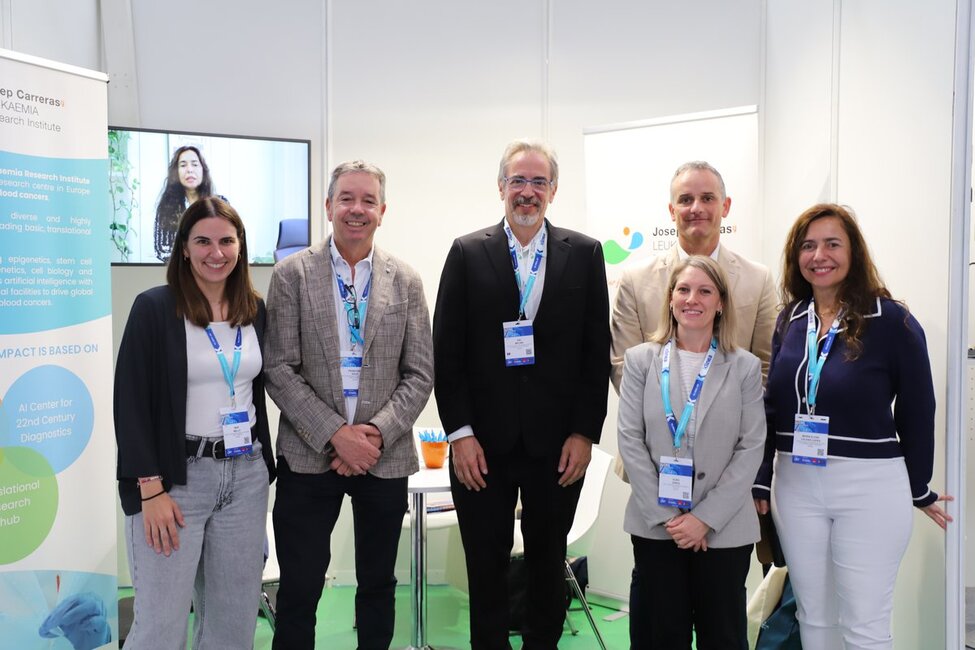The Josep Carreras Institute strengthens its knowledge transfer strategy at BIOSPAIN 2025
The Josep Carreras Leukaemia Research Institute leveraged BIOSPAIN 2025 to strengthen its knowledge and technology transfer strategy, showcase its research capabilities, and foster strategic collaborations with biotechnology companies, investors, and partners. BIOSPAIN 2025 was also the perfect occasion to present IJC new leadership and initiatives aimed at accelerating the translation of scientific discoveries into clinical applications.

With more than 2,400 attendees, the 2025 edition of BIOSPAIN confirmed its status as a key platform for sharing knowledge and fostering collaboration among the main players of the biotechnology industry in Spain and Europe. Barcelona became a hub of biotechnology innovation, bringing together companies, investors, research organisations, and other stakeholders.
The Josep Carreras Leukaemia Research Institute (IJC) attended BIOSPAIN with a strategic focus: to promote knowledge and technology transfer while highlighting the capabilities of its research groups. The Institute aimed to strengthen partnerships with biotechnology and pharmaceutical companies, investors, and other stakeholders, and to explore new opportunities to develop and commercialise scientific results with clinical or industrial potential. A particular emphasis this year was placed on presenting the Institute’s new leadership and strategic initiatives designed to boost collaboration, foster innovation, and consolidate IJC’s position as a benchmark in translational oncohaematology research.
The Institute was represented by a multidisciplinary delegation, bringing together expertise from knowledge transfer, translational research, scientific services and talent attraction. Representatives included Dr Alba Ginés from the Knowledge and Technology Transfer (KTT) unit; Dr Gaël Roué and Dr Eloisi Caldas Lopes from the new Translational Hub; Dr Francesc Solé and Dr Mar Mallo, representing the IJC Core Facilities; and Juan Francisco Paz, from the People and Culture Area.
As highlighted by Alba Ginés, KTT Project Manager, “participating in BIOSPAIN fully aligns with the Institute’s KTT strategy, which seeks to increase the impact of the Institute’s research, promote a culture of innovation and collaborations, and build alliances within the biomedical and biotechnological sectors to accelerate the translation of scientific discoveries to patients.” During the event, the team held around 18 scheduled bilateral meetings and several spontaneous interactions with biotechnology and pharmaceutical companies, business development consultancies, technology transfer offices, and investment groups.
The IJC Core Facilities played a central role in the Institute’s presence at BIOSPAIN. Dr Francesc Solé noted that the event offered an excellent opportunity to engage with companies and research centres involved in diagnostics, research, and laboratory equipment, enhancing visibility for both the Core Facilities and the Institute as a whole.
The Institute also took part in BIOSPAIN’s Talent Day, a forum designed to connect emerging professionals with leading organisations in the biopharmaceutical sector. The IJC booth attracted strong interest from students and aspiring researchers eager to learn more about career opportunities in biomedical science. Juan Francisco Paz, People and Culture Officer, described the event as “an excellent opportunity to meet motivated candidates with strong scientific backgrounds and a passion for biomedical research, while reinforcing collaboration and networking with other institutions and companies of the biotechnological sector.”
Through its active presence at BIOSPAIN, the IJC continues to strengthen its role in Spain and Europe’s biotechnology ecosystem, highlight the new lines of technology and knowledge transfer driven by its leadership team, and reinforce its visibility as a leading centre in translational blood cancers research.